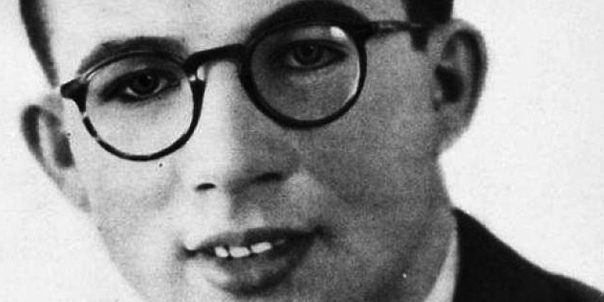Even as a child, Marcel Callo was a bit of a perfectionist. He liked order and displayed natural leadership qualities. He was born in Rennes, France, on December 6, 1921. The second of nine children, Marcel was just a normal boy who had a great sense of humor and loved to play games, especially ping-pong, which he excelled at.
Marcel’s mom taught him the faith at home and the youngster developed a strong inclination to follow Jesus. As he grew a bit older his mom asked him if he thought he might be hearing a call to the priesthood. Marcel told her that his calling was to be a layman where he could do more good for the world.
Marcel started his activities outside the home by becoming an altar server when he was 7. When he was 10, he joined the Boy Scouts, an organization he grew to love. The scouts fit his somewhat perfectionist personality. He began to develop his natural leadership qualities and form a sense of personal discipline. Sadly for Marcel, he had to leave the scouts when he was 12 to go to work.
He began work as an apprentice in a printing shop in Rennes in 1934. This was Marcel’s first time working in the “real world” and the bawdy behavior of the older fellows offended his religious side. The name of Jesus was used in vain, swear words were part of every sentence and dirty jokes bothered him more than he could imagine. Some of the older workers laughed at him and mocked him but he refused to join in. He was dismissed as a “Jesus freak.”
His method of dealing with this antagonistic behavior (today we call it bullying) was to say a prayer to Our Lady that his mom had taught him, “Dear Mother, remember that I belong to you. Watch over me and protect me as your possession.”
His devotion to the Blessed Mother fortified him and that is how he got through his days being the printing shop “Jesus freak.”

Read more:
Pope Francis to youth: Promise Jesus and promise me that you will never bully
Marcel had joined a youth movement at his parish called the Eucharistic Crusade. His religious fervor was beginning to shine through. When he was 14, he joined an organization called the Christian Young Workers Movement (Jeunesse Ouvriere Chretienne) which became known as the “Jocists.” The work was “apostolic” and it suited the young Marcel perfectly. Quickly his leadership qualities began to stand out and he began to be noticed. Then he met Marguerite Derniaux.
World War II had broken out and Marcel became active as a Jocist in the underground. This is where Marcel and Marguerite met. It was an instant connection and the two of them fell madly in love. They became engaged and both vowed that they would pray for their future family and, if possible, attend Mass and Communion daily.
Marcel had told a friend, “I knew I had to wait for real love. I had to perfect my heart before I could offer it to the one whom Christ had chosen for me.” Everything for Marcel Callo revolved around Jesus. He did not even dare kiss Marguerite until his 20th birthday when he proclaimed his love to her.
Unfortunately, the war and the swarming Nazis had consumed the town of Rennes and Marcel was conscripted to serve in the forced labor units. His original intention was to run away and take refuge somewhere until the war was over. But he knew his family would be brought to task for his disobedience to Nazi orders. He told his family and Marguerite that he “was leaving as a missionary in service of his companions.”
Marcel and Marguerite said goodbye to each other on March 19, 1943, the Feast of St. Joseph . Marcel took with him his identification as a scout and as a Jocist. He quickly came under scrutiny by the Gestapo. The Jocists were considered a secret organization and had been outlawed by the Nazis.
On April 19, 1944, Marcel was arrested for his membership in the “outlawed” group. He was told by his captors that he was being brought in because “he was too much of a Catholic.”
The barbaric Nazi court presented its verdict: “Monsieur Callo is too Catholic!” Marcel wound up in the Mauthausen Concentration camp in Austria. In addition to being made to work seven days a week, 12 hours a day, with little food or water, Marcel was constantly beaten and abused. He came down with tuberculosis and dysentery. Once again, the feast day of St. Joseph was an intricate part of Marcel’s short life. He died on March 19, 1945. He was 24 years old.
St. John Paul II beatified Marcel on October 4, 1987. His feast day is the same as St. Joseph’s — March 19. He is the patron of youth workers and those affected by depression.
As for Marguerite, she remained true to her one love and never married. She died in 1997.
Read more:
Husband, father, and priest, Blessed Emilian saved Jews, scorned Nazis, died a martyr

